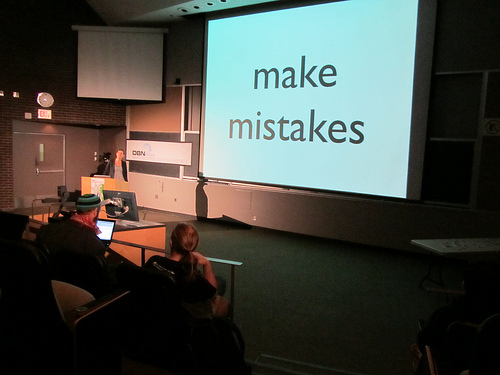I have come up with projects, lessons, games and gimmicks over the years. Some have been successful but, I'm not afraid to admit, many have not. Adolescents, by their very nature, are reluctant to do anything that makes them feel awkward or has the potential for great embarrassment, and speaking a foreign language is one of those things. They feel so shy when it is time to speak because they don't want to look foolish. Interestingly, sometimes it is the very best students who are the least willing to open up and talk because quite often those are students with perfectionist tendencies who cannot abide making mistakes.
So what do we do? Work on their self-confidence, teach them to be resilient to criticism, and remind them that mistakes are part (a very important part!) of the learning process. I'm sure we all have a story or two about a horrible linguistic or cultural faux pas that we made while learning the language. Personally, I mistakenly referred to New Year's good fortune (omikuji in Japanese) as a slug (namekuji in Japanese), horrifying and stupefying a Shinto priest in the process. It doesn't help that slugs are pretty universally reviled in Japan.
Image: Everystockphoto.com
I personally share my stories of shame with my students so that they understand that mistakes happen to everyone. One day even the most shameful mistakes (Embarazado, anyone?) are easy to look back on an laugh. And laughter makes a good classroom tool, I think.Here is a game that will get them talking and laughing. Have the students work in pairs and have half of them turn their desks around facing the back of the classroom, while the other half face the front. Give the students who are facing you a vocabulary word and then they must describe the word to their classmate using only Spanish. I don't let them use hand gestures either. Throw in a couple of non-vocabulary words too - just to keep them on their toes.
You can make it competitive by keeping score or you can keep it relaxed; you know your students and what will work best with them. Mine love to compete so we make it a race to see which pair can come up with the correct word first. In this activity they have to use their communication skills to talk - examples, descriptions, circumlocution - it's a beautiful thing!
Hasta pronto,
--AnneK


2 comments :
I agree that laughter in the classroom relaxes students and lowers their affective filter. I try to share funny embarrassing stories of my own use with language. Great post!
Amy @ http://www.thegiftedgabber.com/
Thanks so much, Amy. I appreciate the support!
<3 --AnneK
Post a Comment